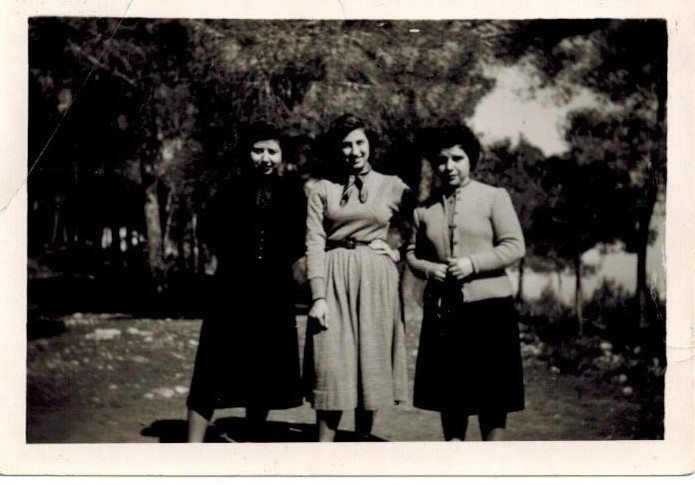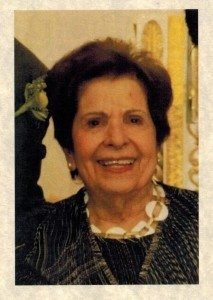Herminé Afarian Menakian passed away recently, on Jan. 21, 2015.2 She was born in Damascus, Syria, to Manuel and “Filor” Afarian, forced deportees from Gurun, Turkey, who established residence in Beirut, Lebanon. Oriort Herminé graduated from Nishan Palanjian Jemaran in Beirut, where she later taught the elementary grades. She was a contemporary of some of the great diasporan teachers, like Levon Shant, Nigol Aghbalian, Simon Vratsian, Mushegh Ishkhan, Garo Sassouni, and Karnig Guzelian, among others. And she was my teacher of arithmetic.

Oriort Herminé was raised among nationalistic Guruntsis who maintained their traditions and culture while living in Beirut. I saw Oriort Herminé, her sister, and her brothers at Guruntsi gatherings. Her mother was a close friend of my Guruntsi grandmother.
She was my teacher in the mid 1950’s. In 1958, she left Beirut to visit New York and, in 1959, she married Mihran Menakian, an American-born Armenian and a teacher in the New York City public schools, a gentle man. The couple visited Beirut and the village where we spent our summers.
Oriort Herminé was a humble, non-assuming individual, yet knowledgeable, confident, and wise. She had a strong sense of her mission early on when she taught Armenian dances to our class and prepared students for the stage. I distinctly remember the play she staged where a spoiled housewife (played by myself) relied on a robot to conduct housework! At the time, videotaping was not readily available and Oriort Herminé’s staging mainly remained in her students’ memories.
Oriort Herminé was friendly with her students, but we knew enough not to personalize our relationship. She knew how to draw firm boundaries. She was a demanding teacher, yet compassionate.

I saw Oriort Herminé periodically in the early 1960’s, when she visited with my uncle’s family in New York. The Menakians lived in New York City where they raised their three children, humbly and with love. As her children grew up, Oriort Herminé devoted herself to community activities, engaged in teaching Armenian in one-day and all-day schools. Her leadership skills and teaching experience guided her while she served the Nareg Armenian School as its principal and Hovnanian School as director of the Armenian language department.
The unthinkable happened to the Menakian family: Their only son, Armen, suffered a fall and a head concussion. He was in a coma for a while. The Menakian couple visited him daily, and Oriort Herminé kept a positive attitude throughout the ordeal. Armen had to receive physical and speech therapy, and the Menakians followed his progress step by step, always hopeful. Armen miraculously survived the accident and recovered somewhat.
Like her son, Armen, Oriort Herminé was a survivor. She survived the loss of her husband in 1994 and courageously gave Armen a pleasant life, taking him on tours all over the world, thus satisfying his passion for travel. They traveled to Armenia and Karabagh, and took other family members, too. In 2007, we organized a gathering of Jemarantsis in her honor and held a memorable cultural evening in Yerevan.
She took care of her health into her old age in order to have the stamina for Armen, to not leave him alone. In a late telephone conversation, she pointed out with satisfaction that Armen was taking care of her, too, by carrying things up the stairs to save her the trip.
After my visits to Gurun and the publication of my father’s memoirs, Oriort Herminé sent me a copy of her father’s account of the 1915 forced deportations from Gurun. The handwritten copy was very difficult to read, yet contained very interesting information. She stated with pride that the reason her father’s family survived was due to his literary fluency in Turkish and Armenian, as well as his benevolence toward people, which was reciprocated when they reached a village with infected eyes (from the dust on the deportation route).
Oriort Herminé told me that she was reading her father’s memoirs to her daughter, Maral, who was translating it into English.
Oriort Herminé had empathy for the underdog, but also had the wisdom to maintain neutrality in a conflict. She was not an emotional individual, but rational and reality oriented. She had a strong sense of responsibility and carried hers with grace and unwavering will. She was a true Guruntsi, even though she was not born in Gurun; Guruntsis are known to be strong willed and goal oriented.
May she rest in peace and contentment for her service to the Armenian community.
I will miss her wisdom, her kindness, her friendship.
Notes
[1] The year of her actual birth was 1926. This is only the official birth year.
2 Her granddaughter, Christina, prepared her biography and delivered the eulogy on Jan. 23, 2015.


Thank you, Meline, for this moving account of Oriort Hermine. I have had the honor of being one of her first students when she accepted her teaching position. I believe she had just graduated from Jemaran and was responsible for our calligraphy course. It’s true. Calligraphy was serious business when I was at the elementary level in Jemaran. She tried hard to make a decent scribe out of me, but I was too impatient. Years later, I was in NJ on a speaking assignment and there she was sitting in front with her sweet smile. God bless her sweet soul. We owe so much to our Jemaran teachers. And God bless you!
Very nice article!
Thank you for sharing your wonderful story. It is a true testimony of the impact Oriort Hermine had on your life, as well as the lives of others. Good teachers are known for such good works.
Being a son of a Genocide Survivor from Gurin, I’m most interested in the two memoirs you mention in the article – (1) Your father’s memoir, and (2) Oriort Hermane’s father’s memoir.
I’ve not come across many accounts from Gurintzis of their experiences during the genocide/deportations/orphanages/etc.
My father’s brother, about ten years his senior, wrote some remembrances of his family in Gurin, and life in Gurin as he recalled from his childhood. However, he didn’t say much, if anything, about 1915 and after.
I would be most appreciative if I can get such information (copies of the memoirs?)in English.
Thank you again for sharing.